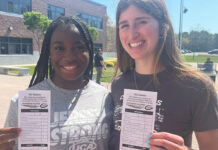
LACEY – While voters in the township overwhelmingly approved the legalization of marijuana in a state ballot question last year, echoing the majority of voters in New Jersey, the issue of whether it should be sold and cultivated locally remains an issue of debate.
Earlier this year, Township officials approved an ordinance that bans the sale and cultivation of cannabis in the community. That measure needed to be taken by August 22. The State Legislature issued a deadline to municipalities to allow, ban or restrict marijuana sales and cultivation in their communities.
Township Committeemen Mark Dykoff and Timothy McDonald proposed a referendum question on the local ballot in November asking residents what their opinion was on the issue. Both officials are seeking re-election in this year’s election.
During recent meetings Mayor Peter Curatolo reminded residents that November’s general election features a referendum question on the ballot.
“The question on the November ballot is to have recreational marijuana being sold and cultivated in our town. I reason that this is not a good idea,” he said.
The mayor added his reasoning for opposition was that it could lead to, “self-medication, minors using it, overwhelming police response, and possible damage to property values for commercial and residential. This reasoning is based in fact and supported unanimously by our chief of police, school superintendent and school board. You can vote ‘no’ if you don’t want it grown, cultivated or sold here.”

He had explained that residents can buy recreational marijuana legally in other towns.
South Toms River and Lakehurst have allowed it.
“This has no impact on medical marijuana,” the mayor noted. Lacey Township approved an ordinance permitting marijuana distribution for medical marijuana in 2019.
During prior committee meetings Police Chief Michael DiBella, members of the Board of Education, Municipal Alliance Director Heather Scanlon and many residents spoke against the idea of permitting marijuana sales/cultivation in the township. The Board of Education passed a resolution supporting the ordinance that banned marijuana businesses in Lacey.
Several residents and some non-residents came forward in support of allowing such businesses to operate in the township. Dykoff and McDonald said they wanted to see more input from the public on the issue as the state vote represented the opinion of many Lacey voters.
Lacey resident Regina Discenza, who also serves as a member of the Township school board, has been bringing her copy of the book “Smokescreen: What the Marijuana Industry Doesn’t Want You To Know” written by Kevin A. Sabet to Lacey Committee meetings. She’s also brought the book to other municipal meetings urging public officials to read it as it examines the more highly potent strain of marijuana currently being sold recreationally.

Discenza said this should be considered as the backdrop to any effort to bring a marijuana industry to Lacey or any other community. “It has some real-life stories of things that happened to real people. This new marijuana is just too potent. It will mess with the brain and no matter how much money you make off of marijuana (from a tax on it) for every dollar generated off of it from tax revenue it is estimated that $10 in social benefits is lost in health-related coverage, car crashes, hospitalizations, work place productivity, criminal justice costs and more.”
She said the book goes on to say ballot initiatives around the country have sold marijuana on the promise that it will generate billions of dollars in state and local income to be reinvested in communities and none of that has materialized.






